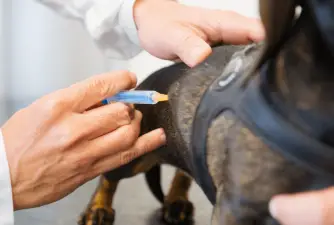Famotidine For Dogs - All You Need To Know
18.04.2021.
Most dog owners are aware that dogs often have gastrointestinal issues. That is not huge news, but it can become problematic when those issues influence the dog’s quality of life. Things like gastritis, stomach ulcers, and acid reflux can be very uncomfortable, and dog owners will do anything they can to help their dogs.
Giving your dog human medication is not that uncommon. There are many human medications dogs can take that can help them with various conditions. One of these drugs is famotidine, but before you give this drug to your dog, there are some things you should be aware of.
What is famotidine?
Famotidine for dogs can effectively reduce different issues connected with stomach acid. It is an H2-receptor antagonist that will stop stomach acid production. It is used in veterinary medicine, although the FDA has not approved its use on animals. The “off-label” prescription is not uncommon, and dogs, cats, and other animals can benefit from it. The most common brands of famotidine for dog use are Apo-Famotidine® and Pepcid®.
Is it safe for dogs to use?
There are different human medications that dogs can safely use, and famotidine is one of them. It is considered fairly safe, and like with any other human drug given to dogs; you should follow your vet’s instructions. Stick to the recommended dosage and keep a close eye on your dog’s reactions to the drug.
Are there any side effects?
Since the famotidine side effects are rare and mild, this is considered a reasonably safe drug for dogs to use. Vets even prefer famotidine over other drugs used to treat gastrointestinal issues. However, like with any other drug, there are potential side effects. The most common side effects of famotidine for dogs are;
- Headache
- Diarrhea
- Loss of appetite
- Lethargy
- Drowsiness
- Constipation
Another good thing about famotidine for dogs is that overdoses are rare. Even if your dog gets into the bottle of famotidine pills, they are not guaranteed to overdose on it. However, they can happen, so learning the signs of overdose is advisable. You should react fast and look for veterinary intervention if you notice vomiting, breathing issues, irregular heartbeat, and blood pressure drop.
Are there any dogs that should not take this drug?
Specific health issues can cause an adverse reaction to this drug, and vets generally advise not to use this drug if the dog has liver or kidney issues. Pregnant female dogs should not use it. Famotidine can be passed through the mother’s milk, so lactating and nursing dogs shouldn’t use this drug.
When is famotidine prescribed to dogs?
Vets prescribe this medication for all sorts of problems connected to the dog’s gastrointestinal tract. The famotidine’s ability to reduce stomach acid production can help treat;
- Gastritis
- Esophagitis
- Heartburn
- Acid reflux
- Renal failure (as a preventive measure for ulcers)
The most common issue for this famotidine is prescribed is gastrointestinal ulcers. The reduced stomach acid production will allow ulcers to heal and prevent new ones from forming. These ulcers can damage the intestines and stomach and cause bleeding, which can become very problematic.
Famotidine dosage for dogs
The vet should decide the dosage for off-label use of famotidine in dogs. This is a general guide for the usual dosages, but your vet will account for your dog’s medical history and specific issues. You should always listen to your vet regarding dosages for your dog.
The usual famotidine dosage for dogs is 0.25-0.5 mg per pound of body weight. The famotidine comes in pill and liquid suspension forms. Dog owners prefer pills because they are easier to measure. Dogs can take famotidine with or without food, depending on their reaction to the medication.
Other drugs with famotidine
Your vet might prescribe your dog antibiotics at the same time as they prescribed them famotidine. That will happen if your dog has stomach ulcers caused by H. pylori bacteria that vets need to take care of with antibiotics. The same applies to the duration of the therapy. Make sure you follow your vet’s advice and stick to their recommendations.
World Dog Finder team







Share